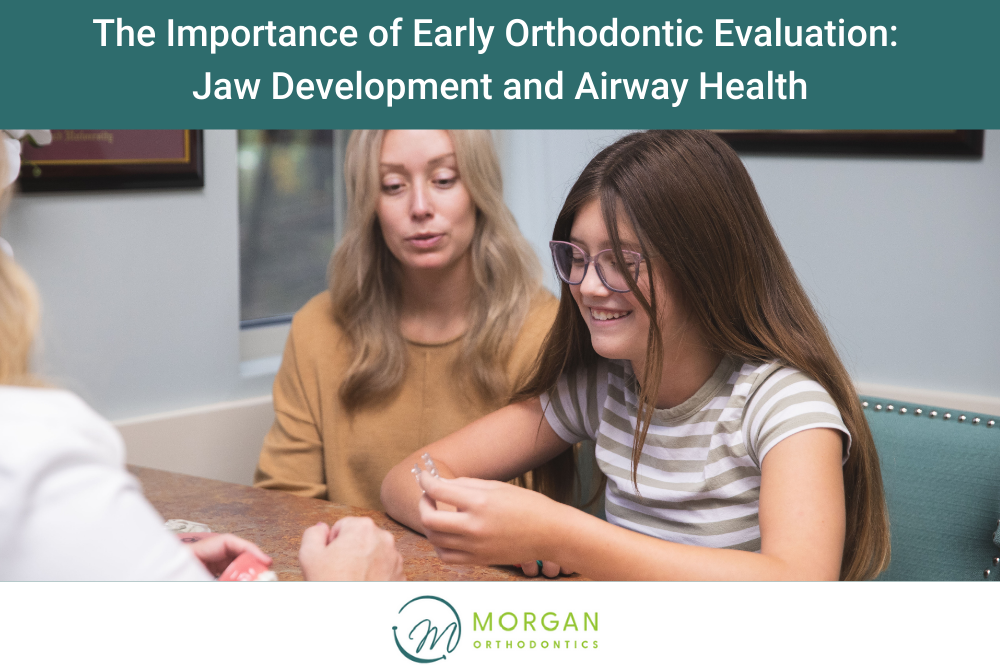 Many parents assume that orthodontic treatment is only necessary when a child’s permanent teeth have fully erupted. However, the American Association of Orthodontists (AAO) recommends that children have their first orthodontic evaluation to at least be by age 7. This early assessment is critical for detecting developmental issues that impact not only a child’s smile but also their breathing, jaw function, and overall health.
Many parents assume that orthodontic treatment is only necessary when a child’s permanent teeth have fully erupted. However, the American Association of Orthodontists (AAO) recommends that children have their first orthodontic evaluation to at least be by age 7. This early assessment is critical for detecting developmental issues that impact not only a child’s smile but also their breathing, jaw function, and overall health.
The Connection Between Jaw Development and Airway Health
Proper jaw development plays a crucial role in determining the shape and size of the airway. The upper jaw, or maxilla, is not only the foundation for dental alignment but also directly impacts the nasal passage. In fact, the roof of the mouth is the floor of the nasal cavity. If the upper jaw is too narrow or underdeveloped, it can result in a high, arched palate, restricting nasal airflow and contributing to breathing difficulties.
Signs That Indicate a Need for Early Orthodontic Evaluation
Parents should watch for the following signs that could indicate improper jaw development and airway issues:
- Mouth breathing – Children who habitually breathe through their mouth instead of their nose may have a restricted airway.
- High palate – A narrow or high-arched palate can limit nasal space and affect breathing.
- Frequent congestion – Chronic stuffy noses can be a sign of poor airway development and nasal obstruction.
- Tongue thrusting – When the tongue pushes forward against the teeth during swallowing or at rest, it may indicate improper oral function.
- Snoring or sleep-disordered breathing – Difficulty breathing during sleep may be linked to poor jaw development and airway constriction.
The Role of Proper Oral Rest Posture
A child’s oral rest posture—the natural position of the tongue, lips, and jaw when not speaking or eating—affects both dental and airway health. Ideally, the tongue should rest against the roof of the mouth, the lips should be closed, and breathing should occur through the nose. Poor oral rest posture can lead to improper jaw growth, worsening airway issues over time.
What about Myofunctional therapy for infants or toddlers?
Myofunctional therapy is not appropriate for children under the age of 4. If you are looking for a specialist who can assist with feeding and provide oral motor exercises for your infant or toddler, please seek out a feeding therapist trained in oral motor therapy. Traditional myofunctional therapy is not appropriate for children under the age of four since they need to follow complex instructions. If you are seeing signs and symptoms of orofacial myofunctional disorder with your child under the age of four, we can help.
Myofunctional Therapy: A Key Component in Treatment
So what is Myofunctional therapy? Children under the age of 7 displaying symptoms such as mouth breathing, tongue thrusting, and high palates may benefit from myofunctional therapy. Myofunctional therapists work with children to retrain tongue posture, improve nasal breathing, and strengthen the muscles that support proper jaw development. When combined with early orthodontic intervention, myofunctional therapy can help create long-term improvements in breathing, speech, and overall facial development.
Why Early Intervention Is Essential
By evaluating children at age 7, orthodontic specialists can detect and address growth issues before they become more severe. Early treatment can:
- Guide jaw growth and prevent severe misalignments
- Improve nasal breathing and overall airway function
- Reduce the need for invasive treatments, such as extractions or surgery, later in life
- Support proper facial development and a healthy bite
Take Action: Schedule an Early Orthodontic Evaluation
If your child exhibits any of the symptoms mentioned above or has not yet had an orthodontic evaluation by age 7, now is the time to schedule a consultation with an orthodontic specialist. Addressing jaw and airway concerns early can set the foundation for a lifetime of better breathing, sleeping, and overall health.
For additional support, consider consulting with us to assess and improve oral rest posture and tongue function. A proactive approach today can prevent significant health challenges in the future.
Blog Written By:
Bryanna Schwarting, M.S. Ed., CCC-SLP
Owner & Lead Clinician
Speech-Language Pathologist, Feeding Specialist, & Myofunctional Therapist
📅 Book a Free 15-Minute Consultation: www.themouthrehab.com
Contact Morgan Orthodontics
If you or your child needs orthodontic treatment, schedule a consultation with Morgan Orthodontics today.
Leesburg Office:
📍 19420 Golf Vista Plaza, Ste. 120, Leesburg, VA 20176
📞 703-723-5900
Winchester Office:
📍 1841 West Plaza Dr., Winchester, VA 22601
📞 540-667-5446
Purcellville Office:
📍 610 E Main Street, Purcellville, VA 20132
📞 540-338-8125
Visit Morgan Orthodontics to learn more about our services and book an appointment today!